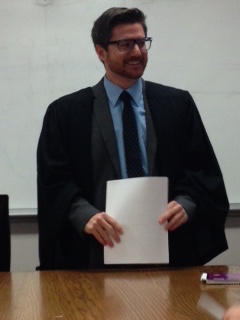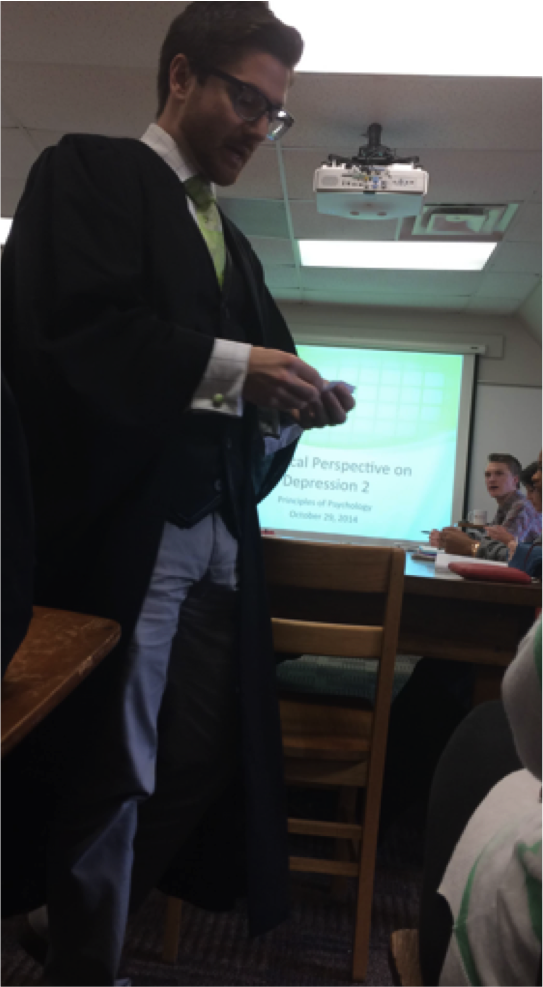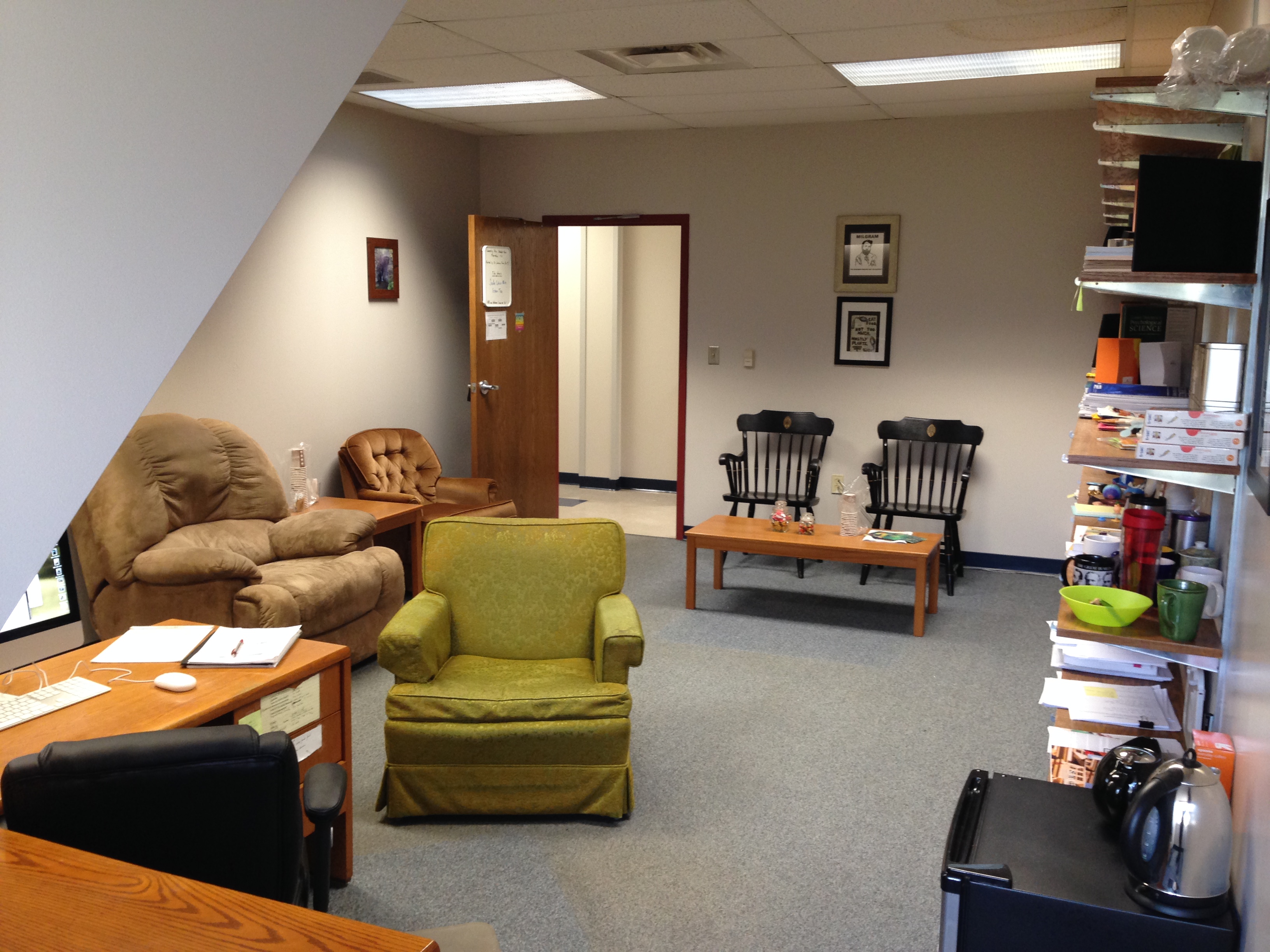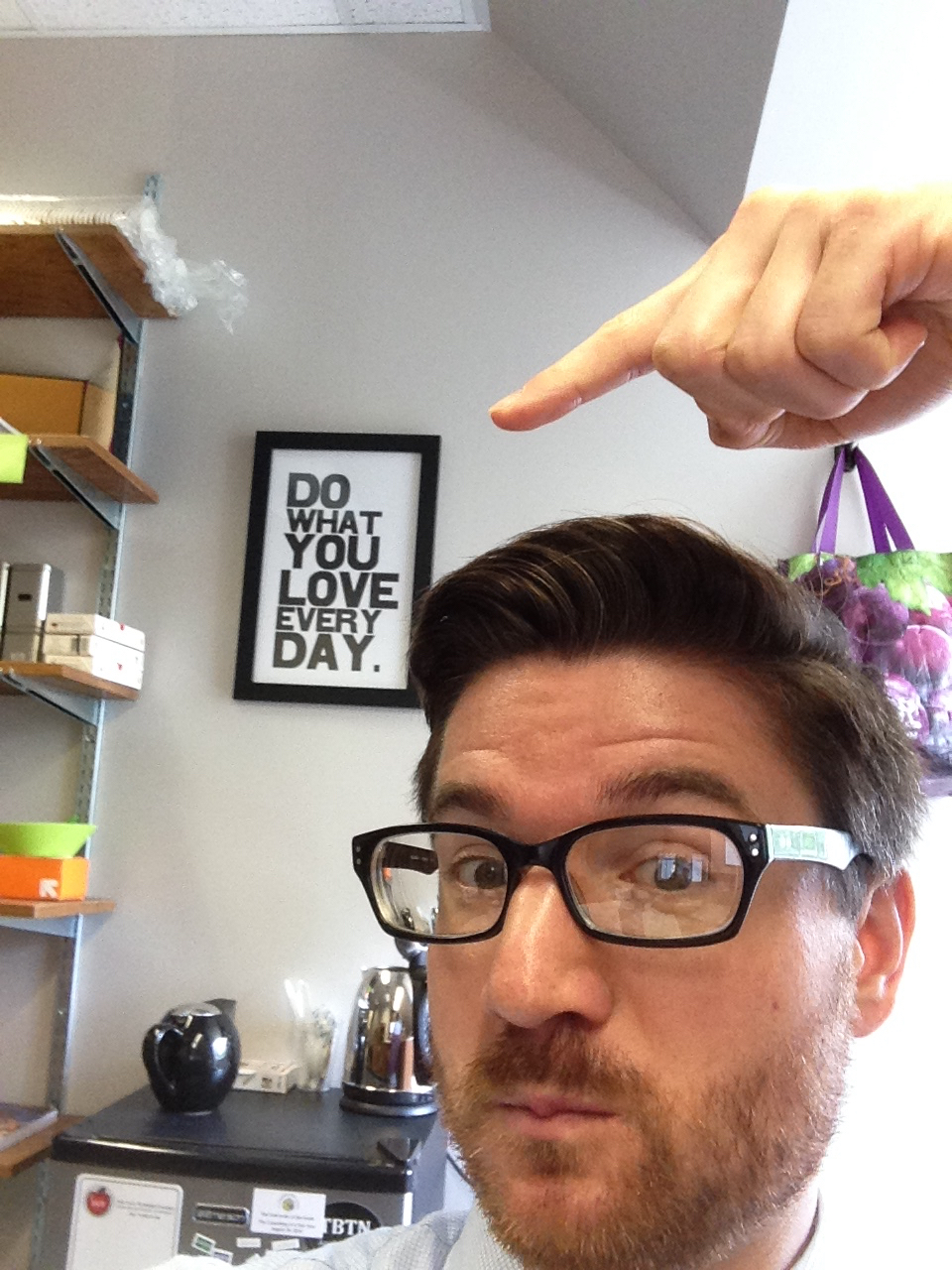YCH
 School name
School name
Sewanee: The University of the South
Type of college/university (e.g., R1, community college, small liberal arts school, high school)
Liberal arts school. And one with many unique traditions as well (see the photos with me in my “teaching gown” in this post).
School locale (e.g., small town, rural area, city, country/region)
Rural area, on a mountain plateau in the Cumberland Mountains of Tennessee
Classes you teach
Principles of Psychology (our Introductory course for intended majors), Social Psychology, Positive Psychology, Research Methods and Data Analysis, The Self-Concept and Self-Esteem. (And many more in the years to come.)
What’s the best advice about teaching you’ve ever received?
I have two pieces of advice that I think are worth sharing, both of which I received when I was just beginning to teach my own courses while in graduate school.
 The first is that there is no one “best way to teach” or one “best teacher” out there in the world. This conclusion was a bit of an amalgamation of a bunch of different pieces of advice I’d received at the time. I’d had a variety of great teachers and mentors as an undergraduate and graduate student. Some where the loud, in your face, rev students up with excitement type; some where the inquisitive, cerebral, and brilliant type; some where the caring, thoughtful, and remarkably understanding type. But these teachers were all effective to me, each for their own reasons, and each because they took who they were and they applied it to their jobs as teachers. Different methods work for different instructors. We in psychology know that the “fit” between the person and the environment is very important for understanding psychological processes. Why should the task of teaching be any different? As someone who was just beginning to teach, with all the anxieties and frustrations that come along with starting something new, this advice helped calm me. It made me realize that I should not be concerned if I did not have all the answers about how to teach and how I wanted to teach. It also made me realize that I had to figure out who I wanted to be, who I was in the classroom, and how those things could merge with one another.
The first is that there is no one “best way to teach” or one “best teacher” out there in the world. This conclusion was a bit of an amalgamation of a bunch of different pieces of advice I’d received at the time. I’d had a variety of great teachers and mentors as an undergraduate and graduate student. Some where the loud, in your face, rev students up with excitement type; some where the inquisitive, cerebral, and brilliant type; some where the caring, thoughtful, and remarkably understanding type. But these teachers were all effective to me, each for their own reasons, and each because they took who they were and they applied it to their jobs as teachers. Different methods work for different instructors. We in psychology know that the “fit” between the person and the environment is very important for understanding psychological processes. Why should the task of teaching be any different? As someone who was just beginning to teach, with all the anxieties and frustrations that come along with starting something new, this advice helped calm me. It made me realize that I should not be concerned if I did not have all the answers about how to teach and how I wanted to teach. It also made me realize that I had to figure out who I wanted to be, who I was in the classroom, and how those things could merge with one another.
The other piece of advice that I’d like to share was also one that has protected my ideas about teaching and dealing with students ever since I started teaching. The advice is that “professors don’t give grades; students earn grades.” At the face of it, this seems like a really true and simple idea, but I often find new and experienced professors alike concerned that they are “giving” students bad grades. I would assume (and hope!) most of us do not sit at our computers and arbitrarily assign bad grades to students. No, not at all. We probably have fair tools for assessing student learning and explicit criteria for what it takes to perform well and to perform poorly, and when students meet the criteria for high grades, they get them. This idea that students earn the grades they get also takes into account a number of factors that professors may be blind to when it comes to students’ lives. When I have honest conversations with students about a poor performance on some graded work, they often say things like “I just didn’t study as hard as I should have,” “the first exam was tougher than I thought it would be,” or “I had other things going on and this assignment didn’t get as much of my attention as it should have.” (Is this reminding anyone of discussions related to external attributions yet?) The takeaway point I get from conversations like this is that poor grades are often a result of students EARNING those poor grades. They can, and hopefully will, do better, but they’ll have to earn those better grades too.
What book or article has shaped your work as a psychology teacher?
There are many books and articles that have shaped my work as a teacher. Certainly, the excellent contributions in journals like Teaching of Psychology have been a great source of ideas about many of the nuts and bolts of teaching.
But two books in particular stand out as having an impact on my long-view of teaching and have been invaluable resources for me. The first is Ken Bain’s “What the Best College Teachers Do.” Bain does an excellent job profiling and interviewing excellent college teachers in a variety of subject areas. They teach in different ways, but they all have one thing in common: they make a substantial, long-term impact on the way students think, act, and feel. It’s a great read. My recommendation: read it at the beginning of a summer right before you are preparing a new course. And keep at the forefront of your mind the ways that new course will not just be a new course on a particular topic, but one which will profoundly influence the ways students will see the world. (OK, maybe I set some pretty lofty goals.)
The second book I want to mention is Parker Palmer’s “The Courage to Teach.” Simply put, this book is inspirational for people who wish to make teaching their life. It was the first book I came across that helped me put into words what I felt about teaching: that teaching and the learning life was something I cared about very deeply, and it was OK to experience significant emotions about teaching. Early in the book, Palmer notes that as teachers we all have good days and bad, but that he wanted to write “for teachers who refuse to harden their hearts because they love learners, learning, and the teaching life (1998, p. 1). I was hooked then and there.
Tell us about your favorite lecture topic or course to teach.
Each of the courses I teach has a special place in my heart for one reason or another. But if I had to pick, I'd say the one I enjoy teaching the most is Positive Psychology. It's a bit out of the ordinary for me, because I have a very heavy research/experimentation focus to the scholarship I do. But to be able to work with students in a critical examination of their sense of self, their emotional experience, and their day-to-day existence is a real treat for me, and the students enjoy it as well. Many students pursued psychology as a field in search of answers to questions about happiness and optimal functioning (myself included), yet most psychology courses fail to provide any clues about how to achieve these things. We are also at a point in time where students have lives that are jam packed with obligations, and they are often struggling with the idea of whether or not they have achieved “enough” to move on to the next stage of life successfully. (And professors often feel the same way, which is why I usually participate in all of the homework assignments in the class along with my students). Positive Psychology gives us a chance to say to ourselves, “wait a minute, valuable, pleasurable, and fortunate things are happening every day; let's take notice.” I don't think people do that enough: students, professors, or otherwise.
Describe a favorite in-class activity or assignment.
It’s hard to pick just one favorite, but one I’ve been enjoying quite a bit lately has been a behavioral shaping activity that I use in my Principles of Psychology course (and I’m fairly sure I stole this from someone in STP. So thank you!). After talking about topics and learning and behaviorism for awhile, students are often skeptical of just how significant rewards and punishments can be. So I ask for a student volunteer to be the “learner” and step out into the hallway for a minute while the rest of the class and I decide what type of task we want the “learner” to demonstrate. They usually pick something like “write her name on a particular chalkboard.” Once we agree on what the desired behavior is, we have the “learner” come back into the room and cheer for behaviors which get closer to the desired goal or boo for behaviors which are farther from the desired goal. All the students are quite amazed at how significantly this influences behavior and how closely the “learner” often gets to a very specific behavior. Some students also rightly recognize that this is like the game of “getting warmer-getting colder” that they played when they were kids. Then I tell them it seems that they have been dabbling in behavioral principles for quite some time already.
What teaching and learning techniques work best for you? (quizzes? homework? take home exams?)
I teach at a small liberal arts school, so I count myself as fortunate to have small class sizes which do not inhibit the learning techniques I can have students engage in. I use a wide variety, including exams, discussion, application-type papers, extrapolation-type papers, and so on. I have not been as concerned about which of these are or are not effective; I’ve been more concerned with how each one may get at a different type of learning and skill. Exams are great for checking knowledge; papers are great for measuring student’s ability to thoughtfully respond to a topic and communicate effectively; discussions are great for developing and advancing ideas and debating. In my classroom, each of these has a role in shaping what I hope to be citizens who are thoughtful, knowledgeable, and interested in topics related to psychology and the life of the mind.
 What’s your workspace like?
What’s your workspace like?
I have been very fortunate to move into a rather large office space, which has afforded me the opportunity to shape it in whatever ways that I find most conducive to how I like to do my “work.” I spend a lot of time in my office, so having it be the space that I wanted it to be was very important to me. But the “work” that I do there is quite varied. I have a large desk with organized stacks of papers and folders which all have a dedicated purpose. I have a wall full of shelves which has books, journals, readings for ongoing classes, and stacks of research articles organized by topic or ongoing manuscript task (as you may have guessed by now, I use the traditional “academic stacking system,” but always in an organized fashion). Mixed in with these readings and work-related items is a significant amount of personal memorabilia (e.g., photos, cards, gifts, Frisbees). I like having this stuff around, and I think it also helps students realize that professors are actually real-life people as well. Oh, and I have an area where I make tea and lots of chairs in my office. Our students our very engaged with their professors, and I often have visitors in my office. This is particularly true during my “tea student hour,” which I hold weekly on one afternoon a semester.
Three words that best describe your teaching style.
Engaging, funny, thought-provoking
 What is your teaching philosophy in 8 words or fewer?
What is your teaching philosophy in 8 words or fewer?
Do what you love every day. (Teach.)
Tell us about a teaching disaster (or embarrassment) you’ve had.
I haven’t had something I would call a disaster, but there is one moment I can recall where I learned something in the classroom that would forever change the way I go about teaching. For the second class period for the first class I ever taught, I had structured a lecture in a way that had me just listing off facts and findings from the field of psychology. I was using PowerPoint as a backdrop, and I found myself just going through one slide, then another, then another, where I was just telling students information. After about 5-10 minutes of this, I came to a realization: I thought to myself “this is pretty boring for me.” Then I came to a second realization: “if this is pretty boring for me, someone who is invested in and cares about this field of work, imagine how boring this must be for students!” From that moment on, when structuring class time, I’ve made sure not only to think about what I will be teaching, but also what and how students will be learning. (And I never lecture for anymore than 5 minutes or so without having some direct student involvement.)
What is something your students would be surprised to learn about you?
Many years ago I came across the psychological concept of self-complexity: the idea that one's sense of self can be composed of many different aspects, and that having more aspects of the self is generally helpful in fighting stress. I thought that was a valuable way of thinking about the self, and an apt description of how I generally am. As such, students may be surprised at the various aspects I've incorporated into myself over the years (although, in truth, I don't mind admitting most things about myself, and many of them may not be "surprises" to my students).
But here are a few potential surprises. I am a fitness enthusiast, and this has led me to run one marathon, take countless hikes of very long duration, and play Ultimate Frisbee all across the US, as well as in Canada and Ireland. About once or twice a year, I grow out my beard to a significant length, shave it into a mustache for one reason or another, then shave my face entirely. (My students then realize what 16-year-old-Dr.-Troisi must have looked like.) As a product of a rich liberal arts tradition, I was the editor of a national literary journal while in college, and I still write a poem from time to time. And even though I work very hard as a teacher and researcher, I still enjoy the occasional break for a console video game.
What are you currently reading for pleasure?
Although I have been very busy with work-related tasks lately, I have been very slowly moving through “Man’s Search for Meaning” by Viktor Frankl and Salman Rushdie’s memoir “Joseph Anton.”
What tech tool could you not live without?
This is about as low-tech of a tech tool as you can get, but my number one thing would be email. It’s how I communicate with everyone. It’s how I keep track of things I need to do. It allows me to know which tasks are on my plate and which tasks are on someone else’s plate. It allows me to touch base with all of my students all at once and lets them have a “paper trail” for things like assignments. Without email, my life as a professor would be very, very different.
What’s your hallway chatter like? What do you talk to colleagues about most (whether or not it is related to teaching/school)?
Most of the time the hallway chatter is about something related to our department or our university. At this point of this writing we are in the process of hiring 2 faculty members, so lots of our chatter has been logistical discussions of who is making sure the candidate does not get lost in the shuffle of interview activities. Otherwise, many of our conversations are about students, class activities and tasks, and our courses. I work with a group of individuals who cares about teaching very much, so we are always thinking and talking about it.
PSYCHSESSIONS UPDATE: Listen to Jordan talk with Garth and Eric in 2019 about his "origin story," Albion college, and the STP annual conference on teaching!
https://psychsessionspodcast.libsyn.com/e053-jordan-troisi-insightful-appreciative-service-oriented-and-authentic
